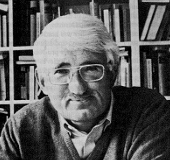Jürgen Habermas
From Geography
AnkeJanssen (Talk | contribs) |
AnkeJanssen (Talk | contribs) |
||
| Line 65: | Line 65: | ||
[[Category: Persons]] | [[Category: Persons]] | ||
| - | Page added to the category [[Late-modernity]] | + | Page added to the category [[Late-modernity]] by Anke Janssen |
[[Category: Late-modernity]] | [[Category: Late-modernity]] | ||
Revision as of 11:14, 16 October 2012

Habermas is a famous German philosopher and sociologist (1929). He is recognized as one of the most influential post war thinkers on topics such as capitalist society, democracy, politics, reason and language. There is much to be said about Habermas’ work, and information on his legacy can be easily found online. However the focus in this wiki lies on his influence in the field of human geography.
Contents |
Jürgen Habermas: speech acts and validity claims
Habermas has done the ground work for the development of the concept of speech act. According to Habermas speech acts should be seen as social action. There are three universal types of speech acts (Werlen, 2009, presentation):
- Constitutive: descriptive etc.: cognitive level (truth)
- Expressive: desiring, hoping etc.: intentions and attitudes(truthfulness)
- Regulative: excusing, ordering, warning etc.: social norms and institutions (correctness)
Each speech act needs to be valid for Habermas since his goal is to create an ideal speech situation. He comes up with four types of validity claims:
- Comprehensibility (understandability)
- Truth (consensuality)
- Truthfulness (sincerity)
- Correctness (normativity)
To reach an ideal speech situations the four criterions of validity have to be adopted under condition of rationally legitimized consensus. For that four requirements have to be fulfilled:
- 1 Communicative speech acts (open to critics)
- 2 Disclosure and critique of ‘prejudices’ (Vormeinungen)
- 3 Application of truthfulness
- 4 Use of regulative speech acts
Influence
Although Habermas himself does not write extensively about space or geography his ideas about speech act as well as concepts such as Husserl’s lifeworld and social action in society have been extensively used and further developed by geographers such as Benno Werlen and Wolfgang Zierhofer in their action theoretical approaches to human geography.
Habermas: instrumental and communicative rationality
In the social action theory by Habermas, argumentation is no longer grasped as a kind of philosophical activity but is instead seen as a practical means of producing and reproducing) (autopoietic) social order and structuring society (Zierhofer, 2002). He formed two ideal type of structures of communication (modes of thought): instrumental and communicative rationality, which distinct two forms of action coordination.
- Istrumental rationality is focusing on the most efficient or cost-effective means to achieve a specific goal, but not itself reflecting on the value of that goal (or 'end'). In critically evaluating actions, instrumental rationality tends to focus on the 'how' of an action, rather than on its 'why'.
- In opposite, communicative rationality is focussing on the more normative aspects of social action and communication. Habermas defines it as those communicative conditions in which all kinds of validity claims may be articulated (Zierhofer, 2002). In opposite to instrumental rationality, the communicative rationality focusses on the 'why' of an action.
References
- Johnsten, R.T., Gregory, D., Pratt, G., & Watts, M. (2000). The dictionary of Human Geography (Electronic Version). Blackwell Publishing: Oxford.
- Werlen, B, (2009). Presentation on speech act.
- Zierhofer, W. (2002). Speech acts and space(s): language pragmatics and the discursive constitution of the social. Environment and Planning A, 34, 1355-1372.
Contributors
Published by Henk-Jan van Maanen & Ingram Smit
Links added and image inserted by Aafke Brus --AafkeBrus 12:30, 31 October 2011 (CET)
Page enhanced and improved by Lars-Olof Haverkort --LarsHaverkort 18:09, 22 September 2012 (CEST)
Page added to the category Late-modernity by Anke Janssen